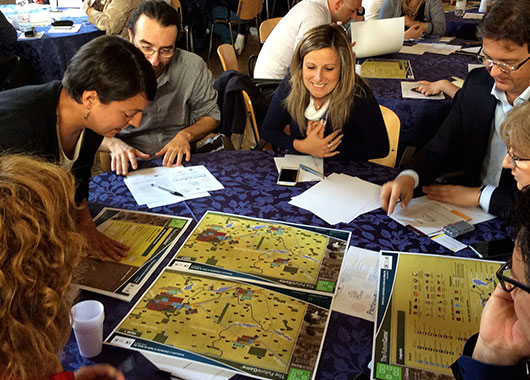I recently participated in a two-day workshop, led by future iQ and funded by the University of Minnesota, to explore a 20-year hypothetical future for agriculture. Participants from Minnesota, Iowa, Illinois, and Michigan included nonprofit professionals, academics, farmers, and investors. The workshop was organized around the idea that a roomful of diverse, accomplished, and curious people would be collectively smart about our shared future.
We heard about the global trends and external forces influencing the future of agriculture: farm scale and mechanization; a push for local and sustainable focus; vegetarianism; and the growing need for protein in Asia, the biggest market for agricultural products.

Then, oddly, we started with a role-playing game set in the very foreign and dry region of western Australia’s wheat belt. Communities faced issues such as salt intrusion resulting from destruction of the native plant community, and dwindling populations in small towns whose identities were wrapped up in their hometown, Australian-rules football teams. A world away from agriculture in the Midwest!
While studying a map of the landscape, we were faced with a series of resource-allocation decisions. We considered the consolidation of small towns, a public angry about taxes, the need for infrastructure and water investments, and whether to cater to local or global markets. We found ourselves 20 years down the road with scenarios that ranged from “Grain and Drain” – an empty, ravaged countryside resulting from short-sighted decisions based on political discontent and cost-cutting measures – to “Harmony with Prosperity” – wherein the environment was considered at every step and small towns flourished with products that were marketed both locally and globally.
The thing is, it wasn’t just a game. It was based on real-world conditions around Perth, Australia, where outside interests were driving the farm economy and threatening the ecosystem, causing small towns to collapse and pushing suicide rates among men to an all-time high. The geographic remove we felt from that scenario allowed us to play the game without having a personal stake in it. (We had no idea what Australian-rules football was and why it ranked so highly in their priorities.)
During the rest of the workshop we defined the key forces shaping the future of our region and how we might manage them. This included focusing on local and global markets, predicting disruptive technology, anticipating labor shortages, forecasting changes in consumer preference, and understanding climate predictions and population change. We developed plausible scenarios and examined the implications of different choices.
The future game is still taking shape and I encourage you to participate in these meaningful ways:
Take this community survey
Parallel to the Think Tank workshop, future iQ is running a community survey to bring a broader perspective into the discussion. The more survey respondents we can gather, the better the data set will be for us to explore this pertinent issue.
| Access the Future of Midwest Agriculture Community Survey » |
Join the conversation
Future iQ has also created an open platform for engagement on the Future of Midwest Agriculture.
| Future of Midwest Agriculture Discussion Topics » |
Let your voice be heard and help shape our agricultural and environmental future.
— Carrie Jennings, research & policy director